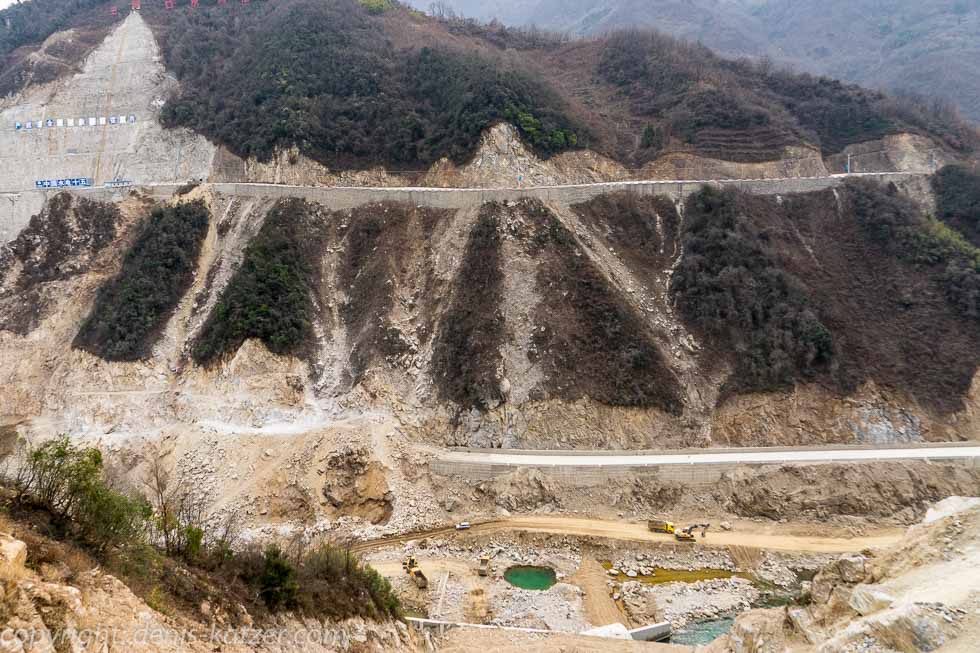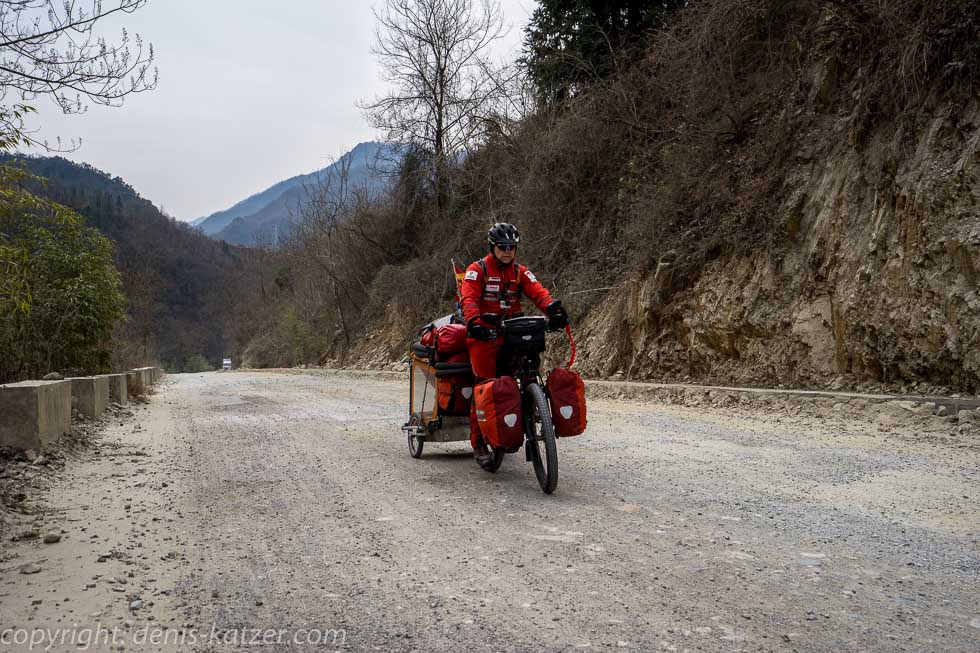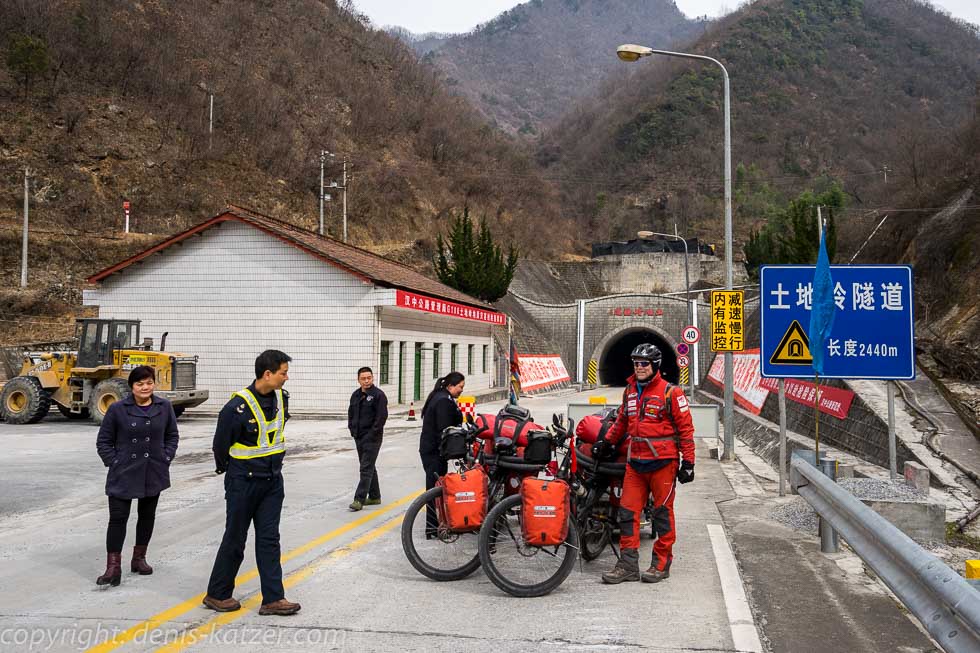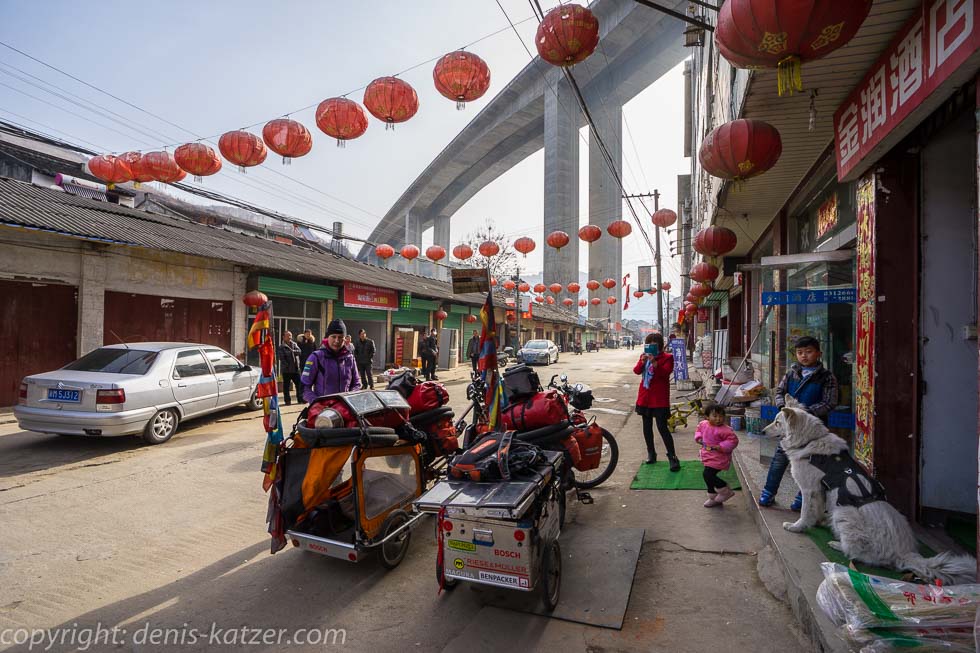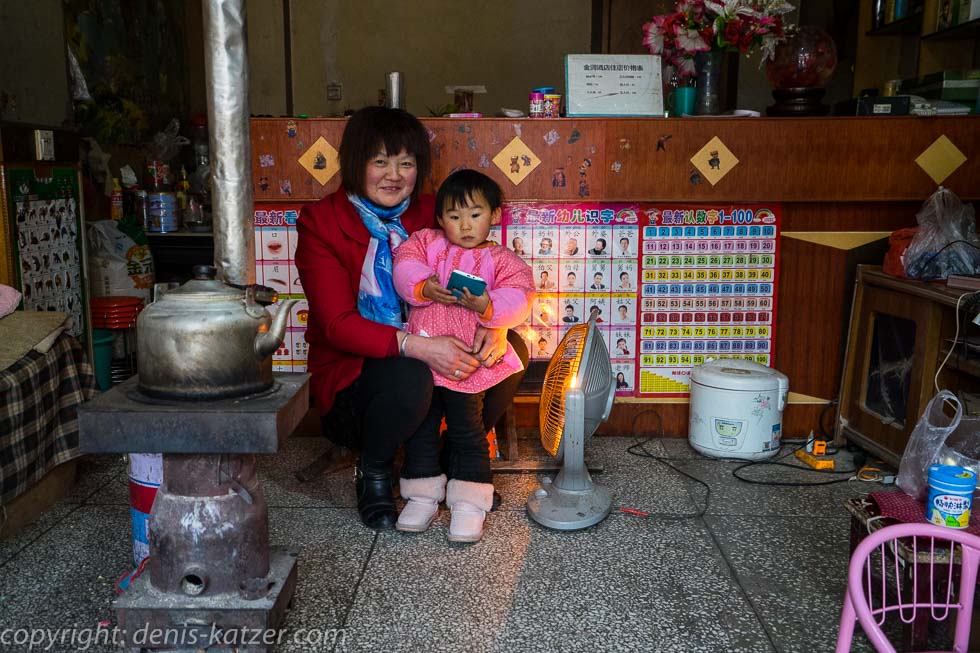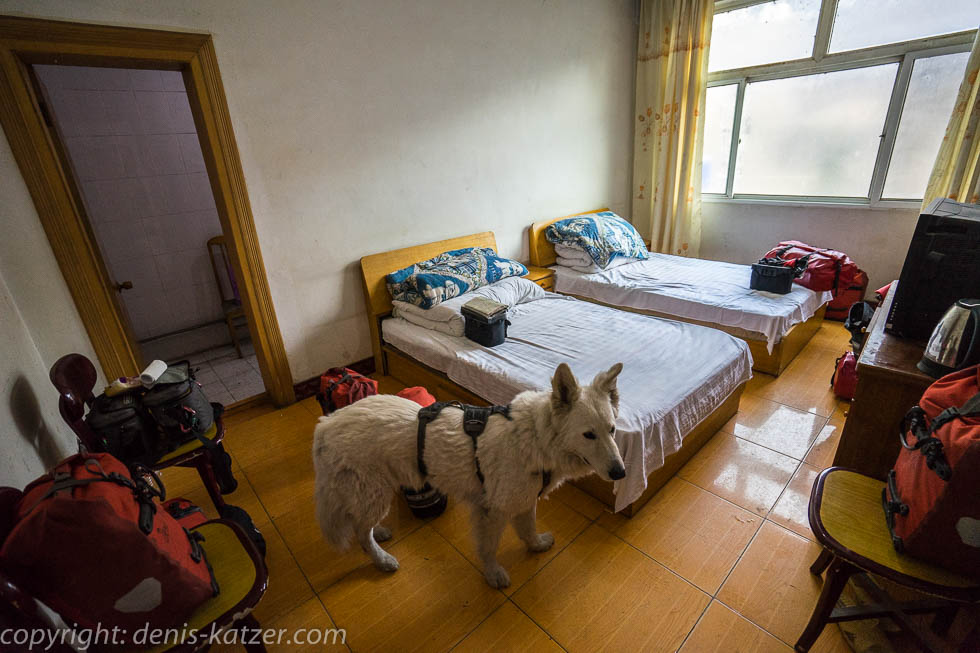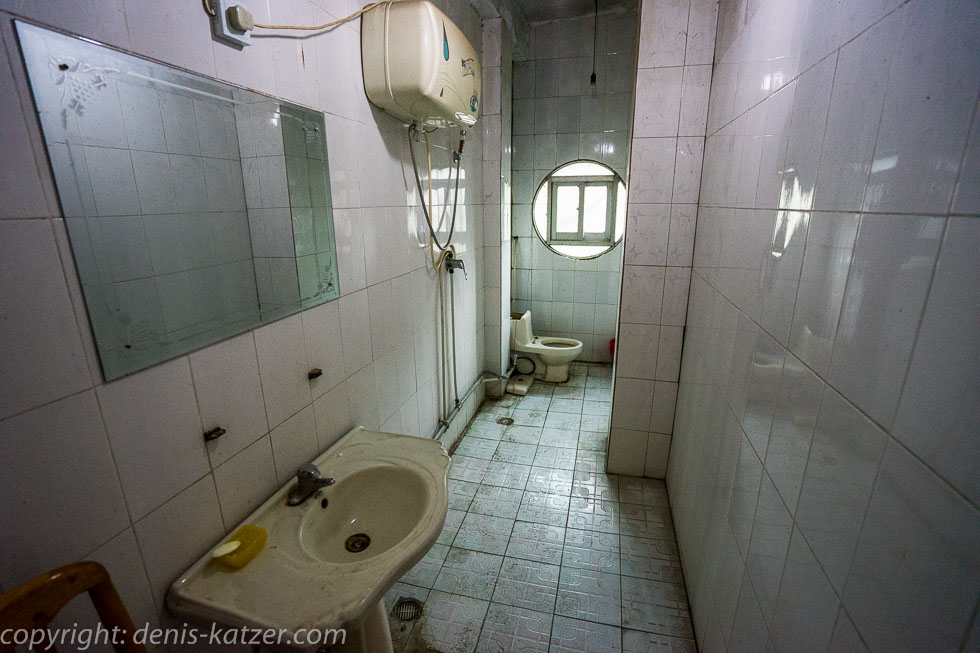
Nuts instead of a hotel
N 33°16'48.8'' E 107°50'52.4''
Date:
18.02.2016
Day: 234
Country:
China
Province:
Shaanxi
Location:
Jinshuizhen
Latitude N:
33°16’48.8”
Longitude E:
107°50’52.4”
Daily kilometers:
106 km
Total kilometers:
12,290 km
As the crow flies:
43.01 km
Average speed:
21.5 km/h
Maximum speed:
53.1 km/h
Travel time:
4:54 hrs.
Soil condition:
Asphalt / gravel
Maximum height:
1.100 m
Total altitude meters:
20.922 m
Altitude meters for the day:
1.000 m
Sunrise:
07:30 a.m.
Sunset:
6:34 pm
Temperature day max:
13°C
Temperature day min:
minus 4°C
Departure:
09:15 a.m.
Arrival time:
16:00
(Photos of the diary entry can be found at the end of the text).
We would have liked to rest a little longer in the pretty little town of Ningshan, but the short time and the 650 kilometers still ahead of us to the city of Chengdu tell us to hurry. Huang Cheng, the owner of the hotel where we are staying, rides ahead of us on his folding bike to show us the shortest way out of the city. “This way,” he says, smiling at us and pointing to the main road. “Zaijian” (goodbye) is how we say goodbye. “Bu ke qi”, (no problem) he says, looking after us for a while.
After crossing the ice pass, we have already ridden 37 km almost incessantly downhill, and today’s route gives us another 30 km downhill. Shortly before a village, the black hole of a tunnel yawns at us on our right. “That’s the way to the highway,” I say, ignoring the mountain breakthrough. The road forks in the village. I ask about our destination today. “Wang hui”, (back) we hear again and again. “Must be something to it,” I say as we are sent in the direction we have just come from for the third time. According to my map, we are not allowed to drive through the tunnel under any circumstances, because this route leads to the highway and I can’t find a smaller road in the map program that we could use. But the locals must know better. Do they understand that we are not allowed on the highway with our bikes? Because our bikes look so beefy with the big load, some people might mistake them for motorcycles. We don’t know and turn back. Shortly before the tunnel, we ask again. The landlord of a small street pub takes my smartphone and reads the place name written in Chinese, which is supposed to be our destination for today. He covers us with a never-ending flow of words, pointing again and again to the breakthrough in the mountain. “Well, let’s try it then,” I reply and ask for my smartphone back, which he is still holding in his hands. The landlord makes not the slightest effort to return my expensive device. Meanwhile, he continues to babble at me. He laughs loudly, grinning in the direction of his guests, who laughingly observe our one-sided communication. “Give me my smartphone back!” I demand of the man who is waving it wildly in the air. Just as he stretches his arm upwards to shower us with more incomprehensible words, my right hand shoots forward, grabs it in a flash and steals my smartphone from the surprised-looking Chinese man. “Xie xie,” I thank him, put the reclaimed device in my handlebar bag, shift into third gear and cycle off. “Did he want to steal your phone?” asks Tanja. “I have no idea. In any case, he didn’t give it back,” I reply. “It’s strange what you experience,” Tanja shakes her head. Before the tunnel, we switch on the lights on the bike, then the darkness takes hold of us. On the other side, I ask again for the direction. “Wang hui”, (back) we hear, startled. Time and again we find that there are often several villages with the same or very similar sounding names. Just emphasize a letter slightly differently and we are sent in the wrong direction. If we are not careful, we can end up taking detours of 100 km or 200 km. That’s why we have now gotten into the habit of asking several times until we get at least three consistent statements. Only then can we be sure that we are not driving the wrong way. “So what now? Here or there?” I ask and show one of the men standing at the side of the road the name of the place on my smartphone. When he wants to take it to have a closer look, I don’t let it out of my hand, shrugging my shoulders at him. “Cong zher zou”, (This way) he says, pointing north. “We’re in the right place,” I say to Tanja, continuing our journey. After a few kilometers, we cross under the adventurous, high bridge construction of the G5 freeway on a new road that is not visible on the GPS or the map program. If we could follow the G5, it wouldn’t be more than 15 km to our destination today, Jinshuizhen. So we are forced to drive 20 km north, then 20 km west and another 20 km south again. A total detour of over 60 km. Anyway, on our journey it’s not about shortcuts, but about being on the road.
We now follow a wonderful, brand new asphalt strip. Many tunnels, some of them almost three kilometers long, save us from having to cross the high mountains. Another lane is being built in the deep valley to our right. The river, which has been meandering through there since the last major earth deformation, is moved without further ado. It is amazing what man is capable of and how much he interferes with nature. Entire mountains are even removed or blasted away and centuries-old landscapes are recreated. This is ensured by an armada of heavy construction machines that are constantly digging and excavating. The required building material is partly taken from the river bed. Countless tons of river gravel are stored on towering mountains to be used later to create fortifications and foundations. The wide tires of our e-bikes whirr quietly over the smooth tar until we see thick clouds of dust rising into the cloudy sky ahead of us. “I think that’s where the new track ends,” I call out to Tanja. In fact, the bitumen is replaced by gravel, dust and endless potholes. At the moment, our bikes have to work very hard and are exposed to mercilessly harsh conditions. The shock absorbers absorb most of the smaller bumps. Now we are only making slow progress. Heavily laden trucks slowly overtake us. The swirling dust obscures our vision and tortures our lungs. We stop, wait for the dust to settle and drive on, only for another metal monster laden with building rubble to overtake us and swallow its dirt. At a fork in the road, a track leads to the left, steeply up the mountain, and another to the right. I decide to take the right-hand road because, according to the GPS, it leads in the right direction and is also closed to trucks. After driving through two unfinished tunnels, we ask a moped driver if this terrible surface will lead us to Jinshuizhen. He shakes his head and says: “Wang hui.” (back) Not for the first time that day and on this mountain route, we turn back, climb the previously ignored extreme gradient and end up on the asphalted main road. From now on we head south again.
After 106 kilometers we reach the small village of Jinshuizhen at 16:00. We ask if there is anywhere to stay overnight here. “Nar”, (There) says a boy who is leading his ox past us and points into the village. Relieved, we turn back and let our e-bikes roll down the narrow, bumpy road into the village. Directly above our heads and the roofs of the houses stretches a mighty highway bridge. It is the G5, which we had already passed under 15 km east of here. “Binguan dsai na-li?”, (Where is the hotel?) I ask two women sitting in front of their store. “Mei you”, (Don’t have) the answer amazes me. “They must have misunderstood me,” I think to myself and ask again: “Binguan zai na-li?” (Where is the hotel?) “Mei you”, (Don’t have) the woman gives the same answer. “I don’t believe it. They say there’s no hotel here,” I say to Tanja, who watches me with a grin as I try in vain to find out the location of the hotel. “Biiiinguaaan?” I say again, emphasizing the word differently. “Mei you,” the woman persists. “Biinnngggguan?” I say, changing my emphasis again. The two women look at each other with amusement. “Binguuuuannn?” I don’t give up. Now one of the two shopkeepers gets up and disappears into the store next door. Moments later she comes back and hands me some strange-looking nuts. “What’s that all about?” I ask, completely dumbfounded. Apparently, with my bad pronunciation, I kept asking for something that wasn’t available here and she brought me some nuts so that I would finally give up. Or did I keep asking for these nuts in my ignorance? I can just imagine how that must have sounded to them. “Where are the nuts here?” “There aren’t any.” “Where are the nuts here?” “There are no nuts here.” “Nüüüsseee?” “There aren’t any.” “Nuts?” “We don’t have any.” “Nüseeee?” “She gave me nuts,” I say to Tanja, who laughs out loud. Now the two women also have to laugh heartily. “Binguan dsai na-li?”, I ask for the umpteenth time, and this time I’ve got the emphasis a little better and the two sales clerks point down the street. “Xie xie,” I thank him with a laugh. In fact, there is a house that doesn’t look like a hotel, but pretends to be one. The owner, who is dressed as if she is about to go to a ball, shows me a run-down open backyard where our precious bikes and trailers are supposed to spend the night. “Bu”, (no) I say. We then agree to take a luxury room for 100 yuan (€14.28). In return, the bikes and trailers are allowed into the small anteroom of the run-down house where the whole family lives. The owner agrees and we are relieved not to have to drive another 20 km today to look for a place to stay for the night in the next larger town.
While I unload the bikes as usual and get them ready for adjustment, Tanja lugs everything up to the third floor. I help her with the last of her bags and when I enter the luxury room for the first time, the dirt and unpleasant smell almost knocks me over. Memories of many a bad place to stay in Russia and Siberia immediately come to mind. Because of the freezing temperatures, I immediately turn on the air conditioning. “Pfffffffff,” she moans briefly, only to give up the ghost immediately. The owner enters the room to give us a kettle, which is standard in absolutely every hotel room in China. While she places the completely dirty thing on the equally dirty old TV, I ask; “What’s wrong with the air conditioning?” She takes the remote control, which is covered in dirt, switches the yellowed thing on and tells me to wait a few minutes. As soon as she has left the room, the ancient thing puffs out again and is dead again. “What the hell. I’ll be fine for one night,” I say, sit down in my beloved folding chair, boot up my laptop to enter today’s log data and feed pictures from the camera into the Lightroom program. I shiver so much from the cold that I think I’m sitting in a shock freezer. As soon as I’ve finished my daily chores, Tanja and I leave this nasty room to look for a restaurant on the street. By now it is pitch dark. The hustle and bustle of the late afternoon has given way to a yawning silence. As if the sidewalks had been folded up, not a single soul can be seen on the entire street. Completely unusual for China. We stumble along the ghost alley in the dark and actually find something similar to a restaurant. The doors are open despite the cold. It’s 7 p.m. and the room, which looks more like a warehouse for garbage, is deserted except for one man. We ask the cook, who is warming his hands at a small brazier, if we can get something to eat. He looks at us in surprise, nods and disappears. Two minutes later he reappears with his wife. While we warm ourselves by the brazier, the two of them prepare a simple rice dish with carrots and lotus roots. We say goodbye again, feeling our way along the dark, desolate sidewalk to our accommodation and crawl under the heavy, dusty blankets that haven’t been used for a long time. Only minutes later I get up again, fetch my sleeping mat, blow it up and lay it on the hard mattress. Tanja’s steady breathing tells me that she has already fled to the land of dreams after the exhausting day. I quickly crawl back under the covers, coughing violently. I’m not going to catch a cold now, am I? My nose is already running incessantly and a slight headache completes my malaise. Exhausted, I look up at the ceiling. The weak beam of light from a broken neon sign shines through the dirty window. He dances up and down the mold-covered wall of the room as if shot. Cars and trucks thunder along the bridge construction above the house. “Boom, boom, boom, boom, boom, boom, it roars incessantly because the vehicles are apparently roaring over a heavy manhole cover or something similar…
If you would like to find out more about our adventures, you can find our books under this link.
The live coverage is supported by the companies Gesat GmbH: www.gesat.com and roda computer GmbH http://roda-computer.com/ The satellite telephone Explorer 300 from Gesat and the rugged notebook Pegasus RP9 from Roda are the pillars of the transmission.
